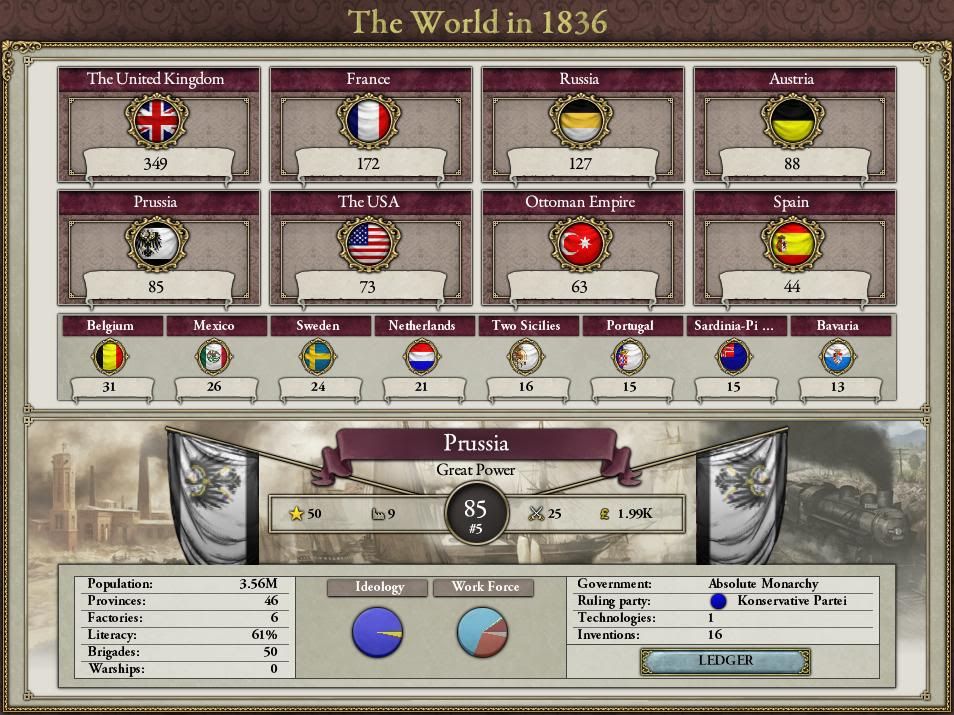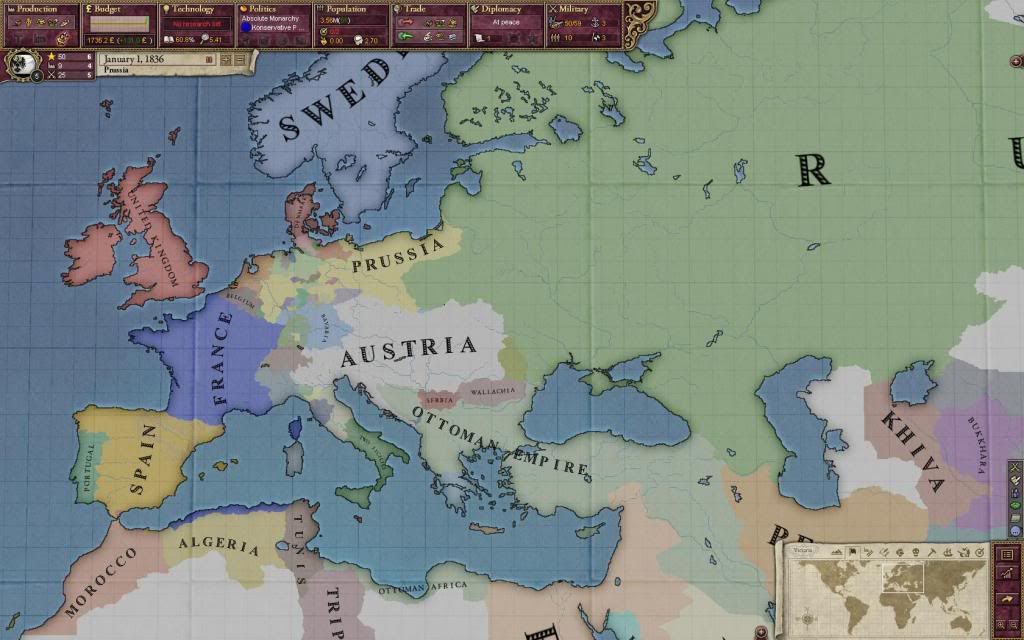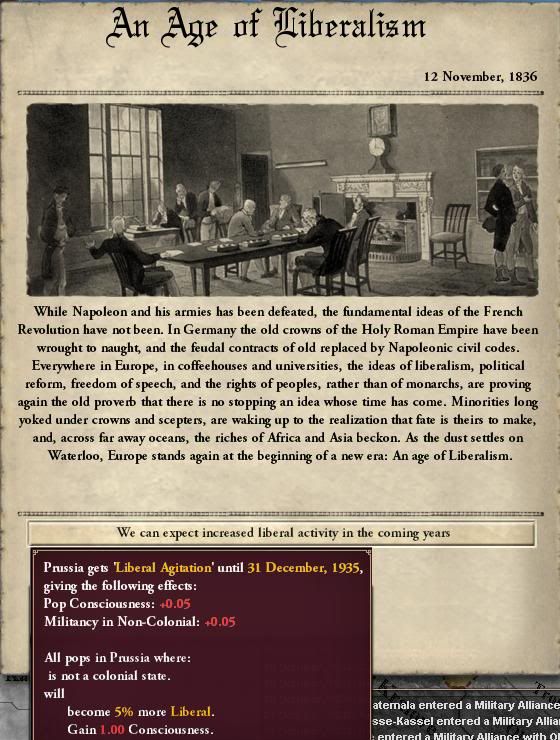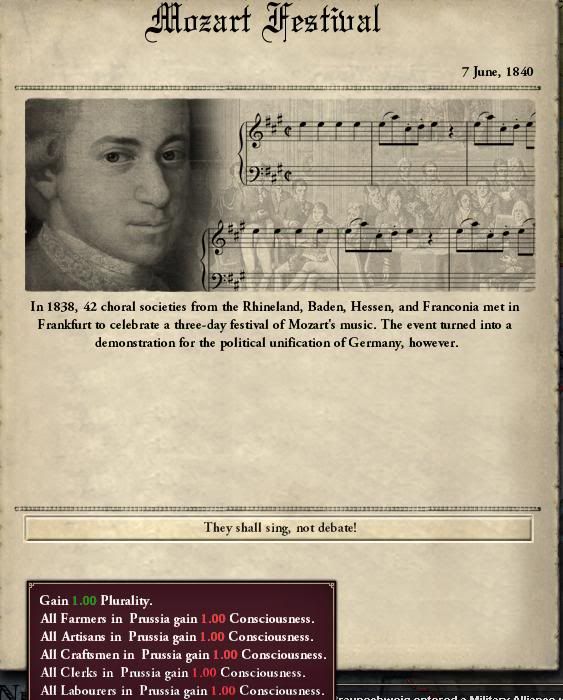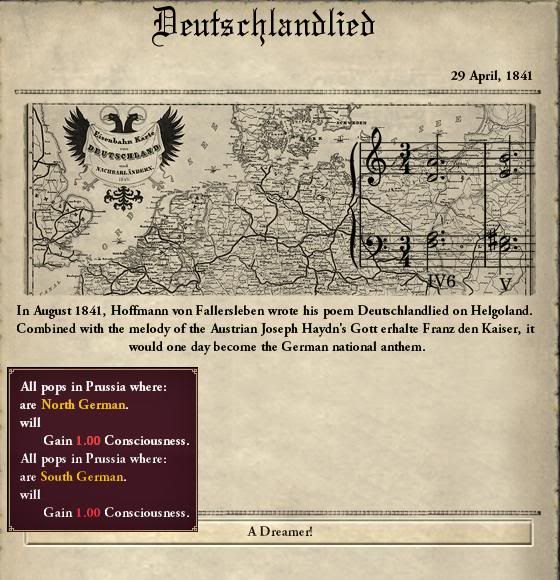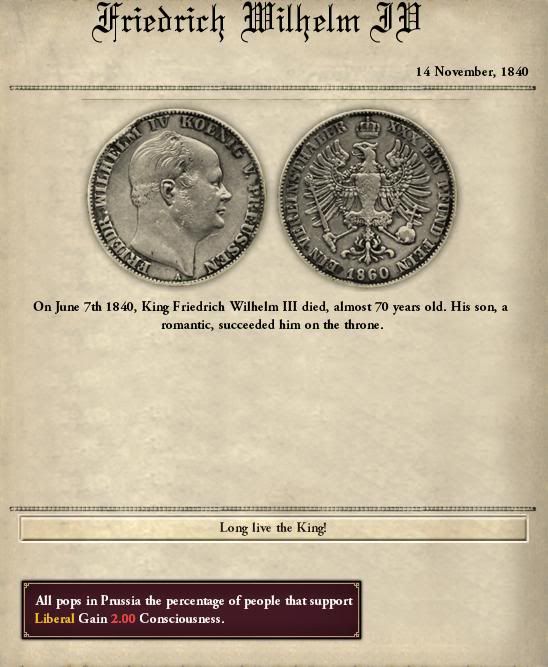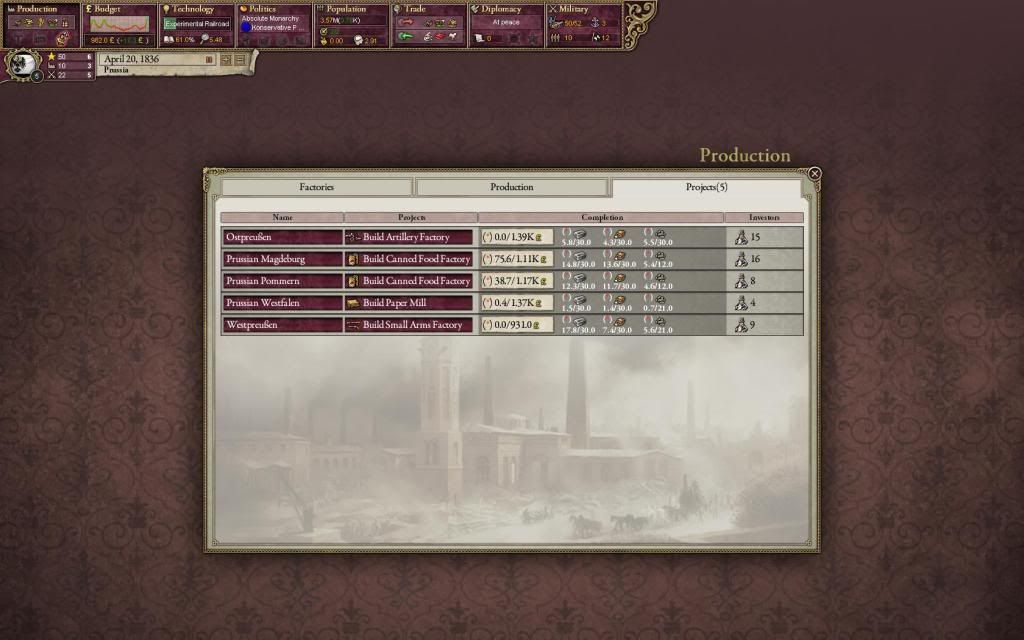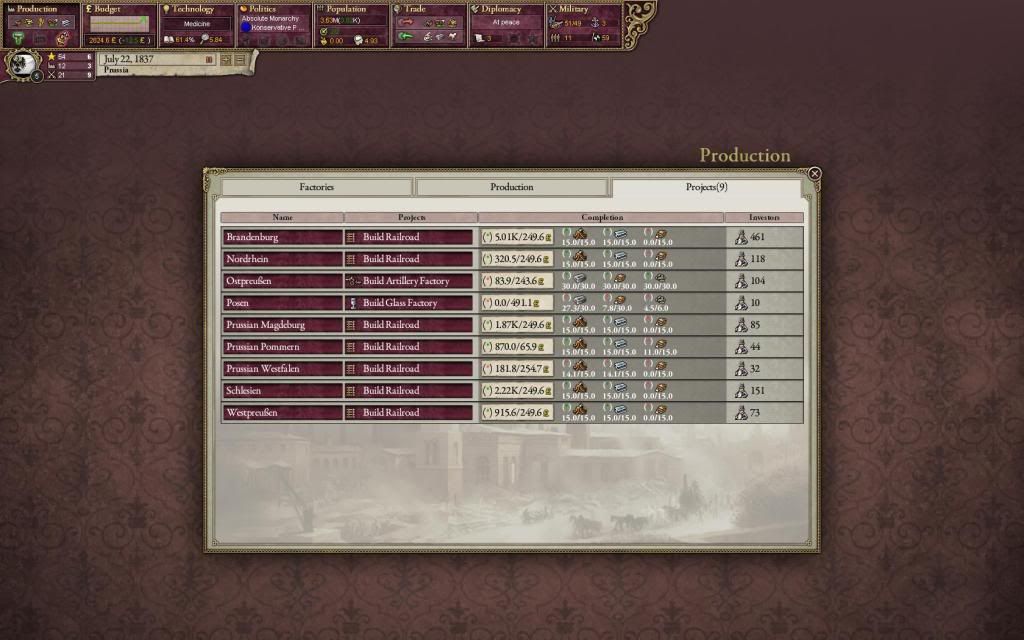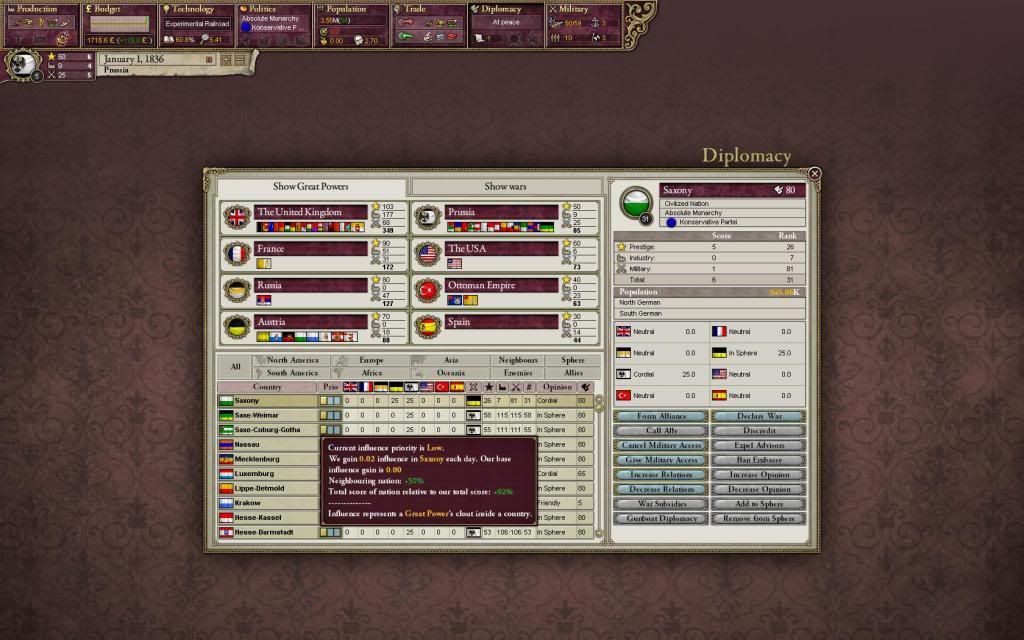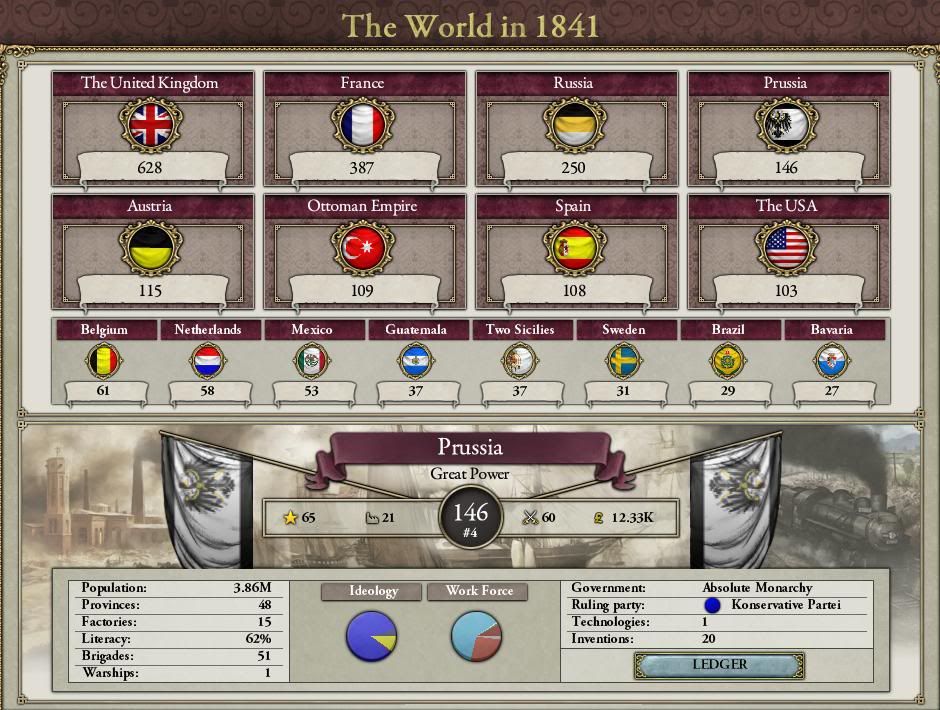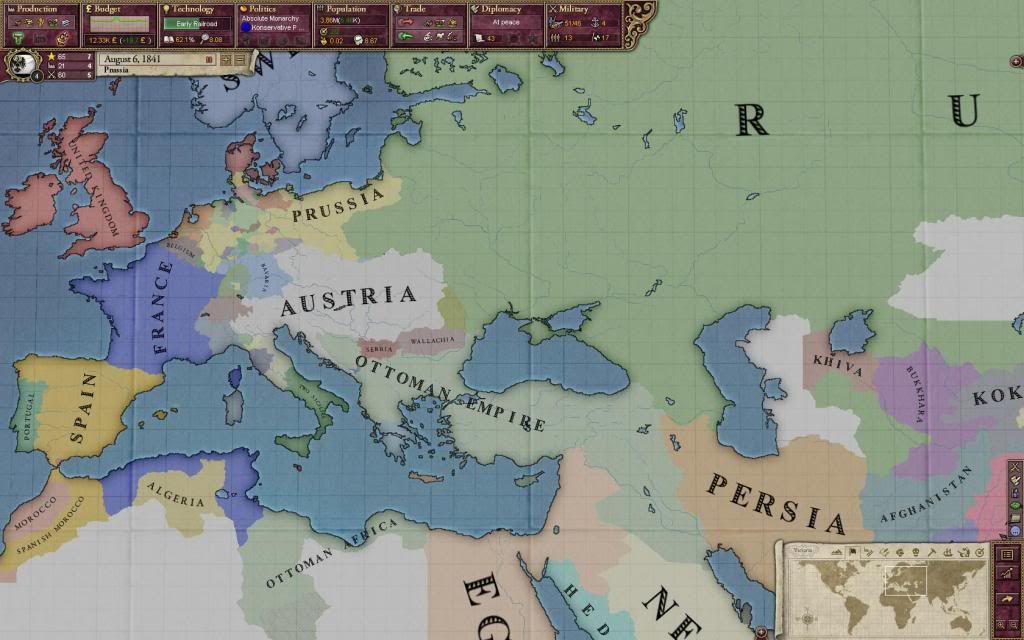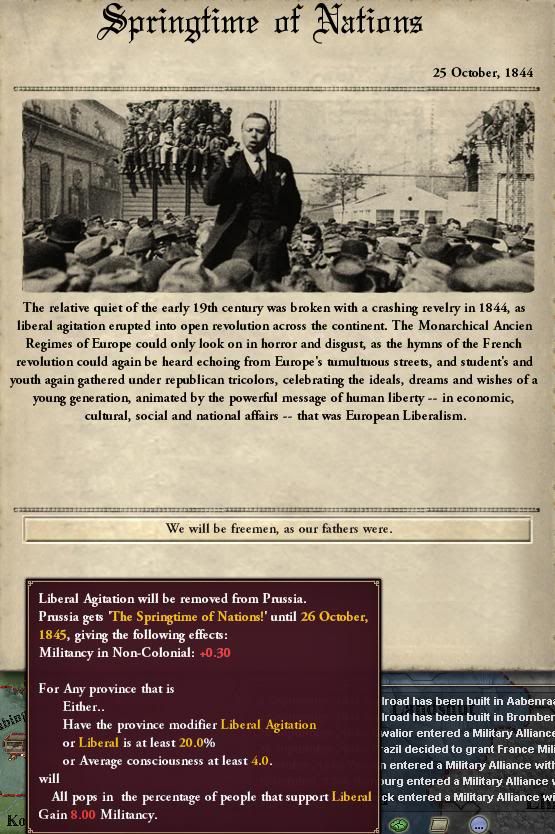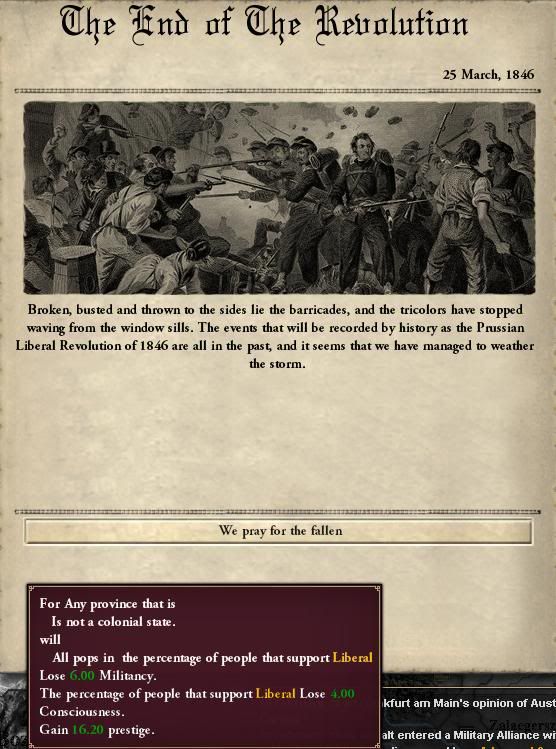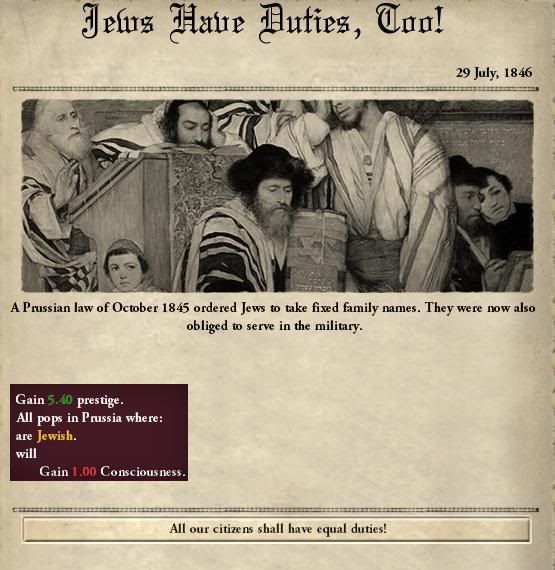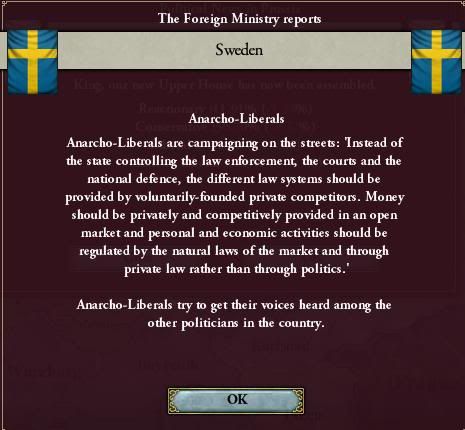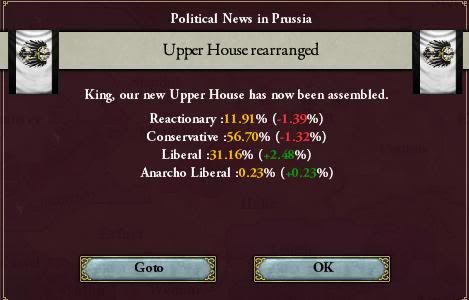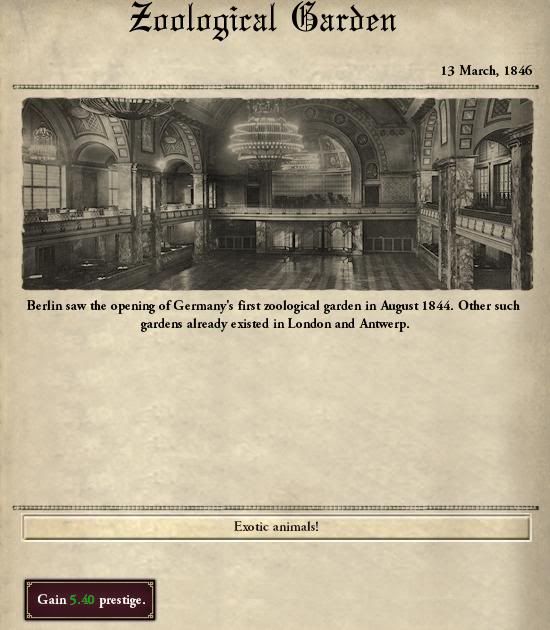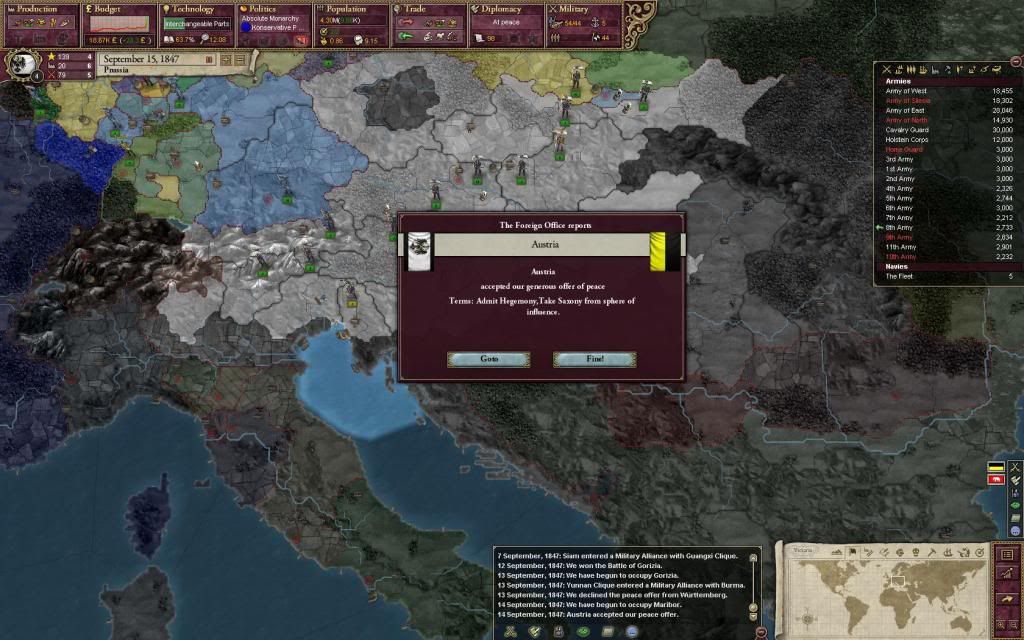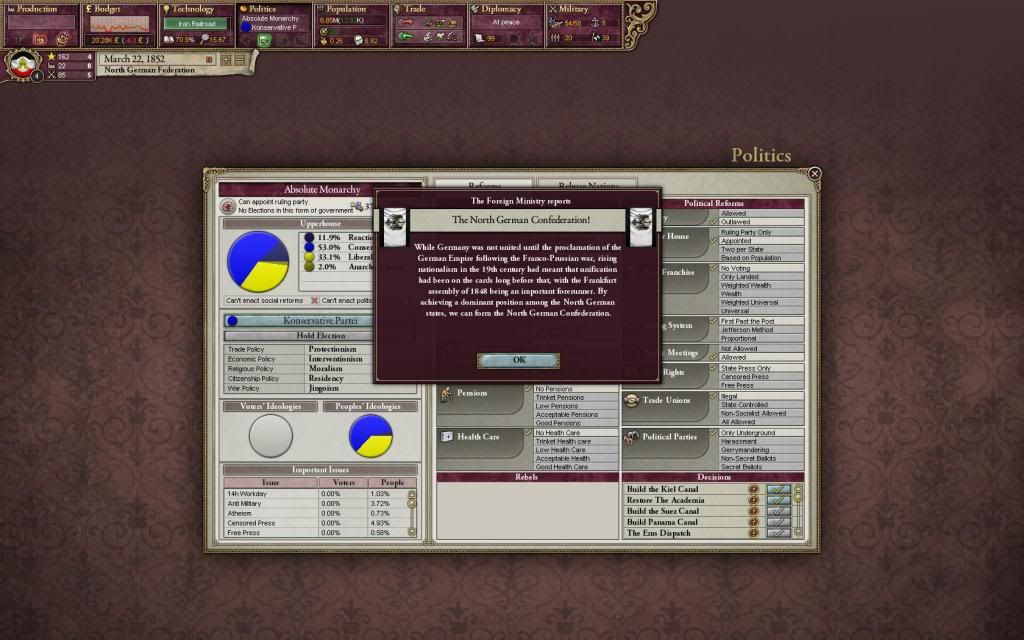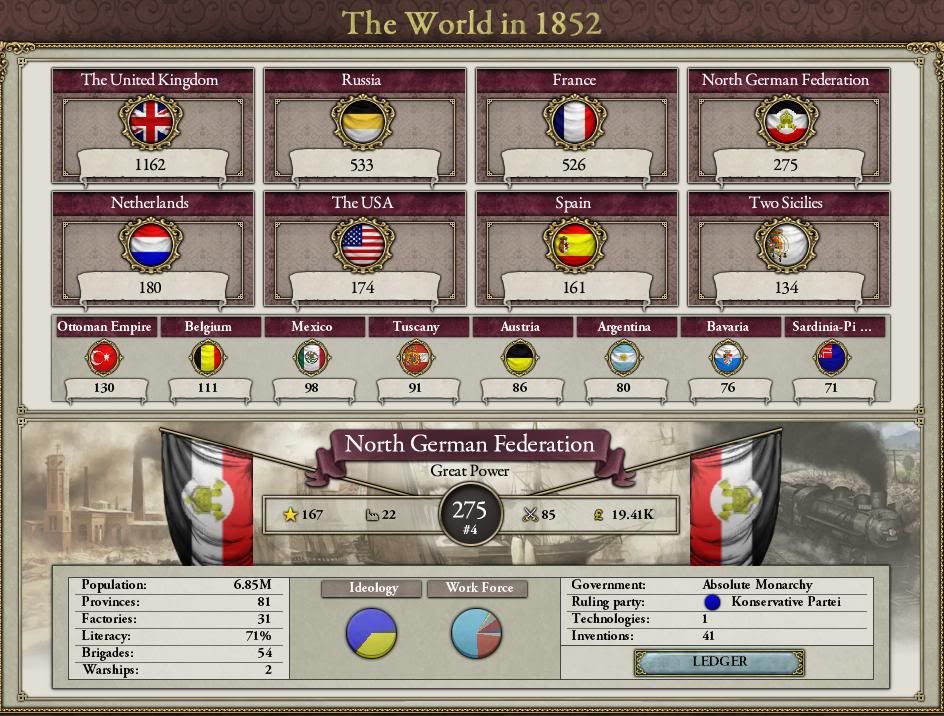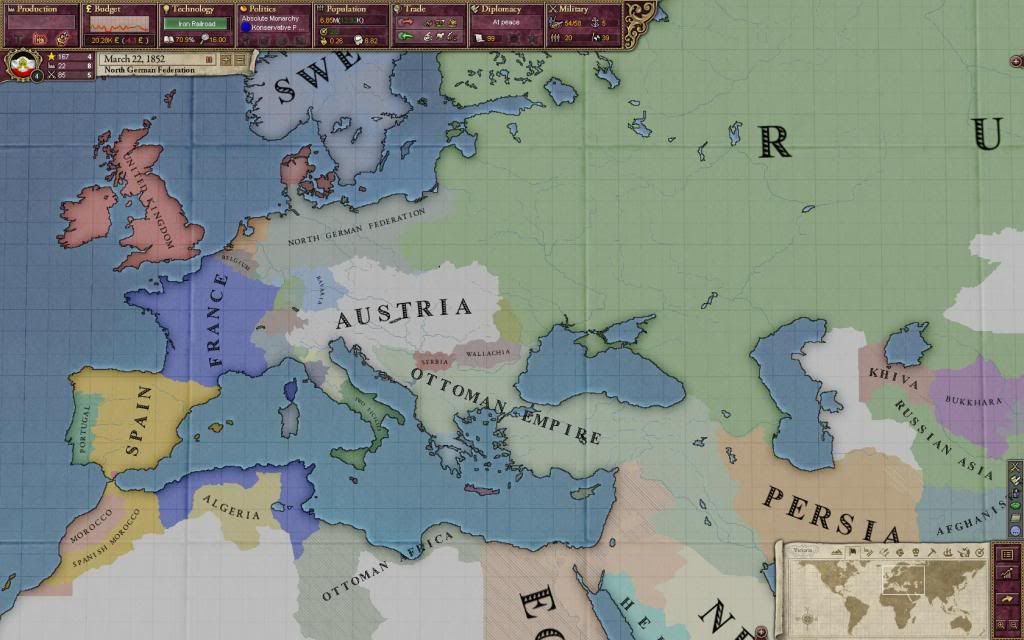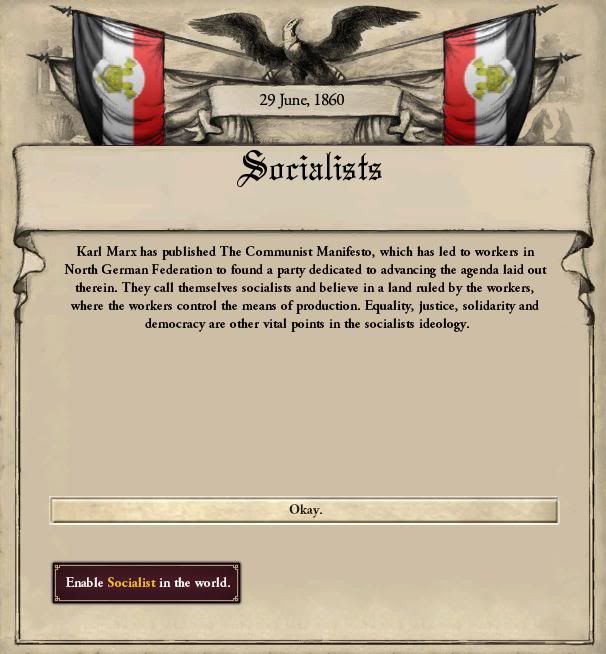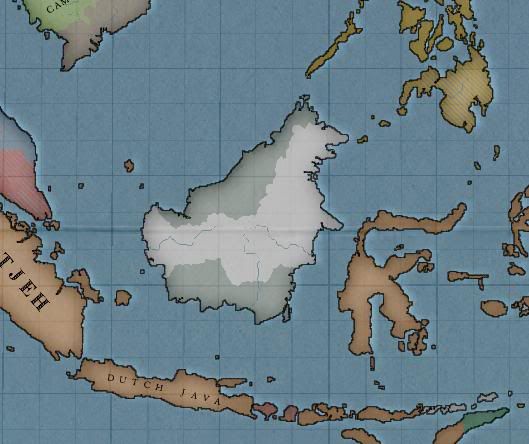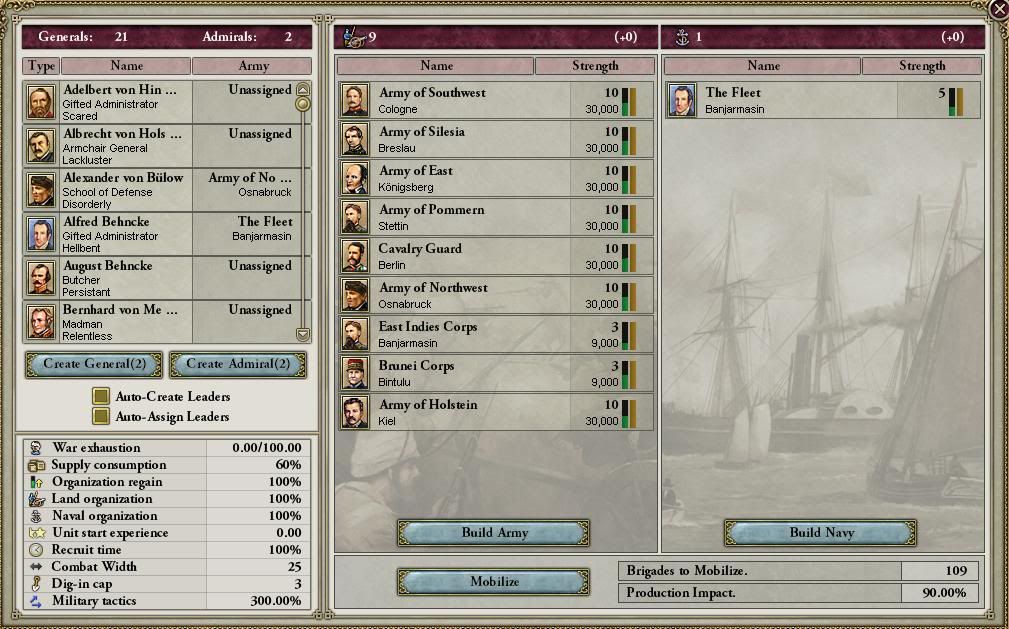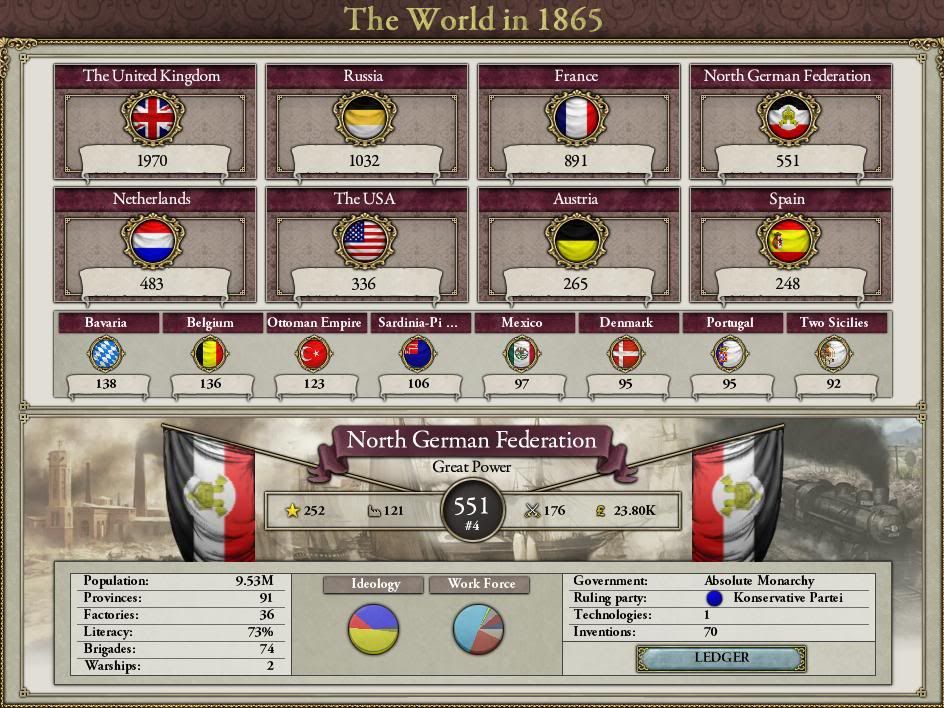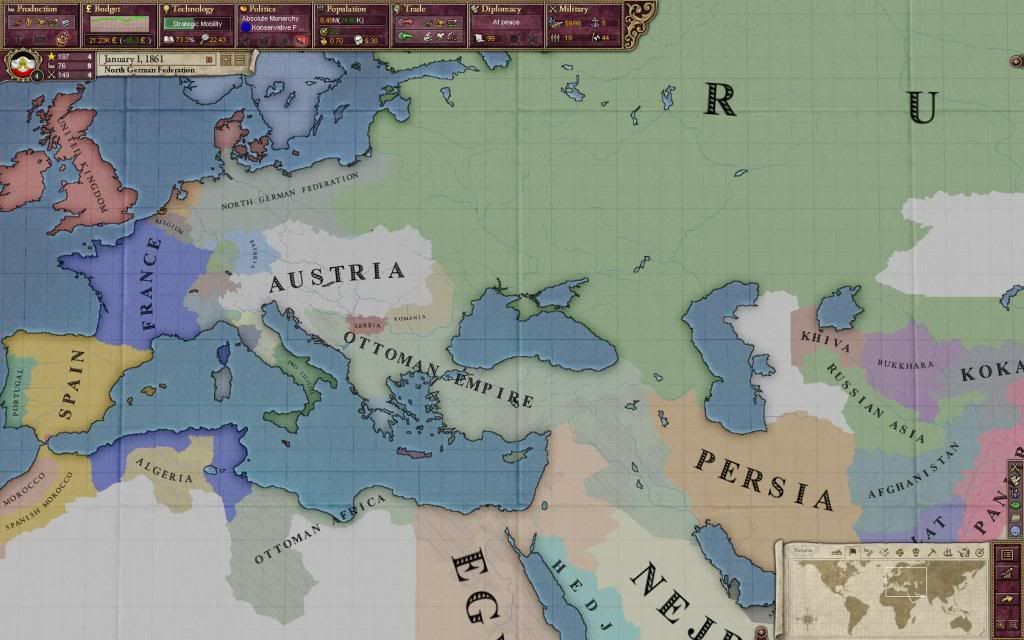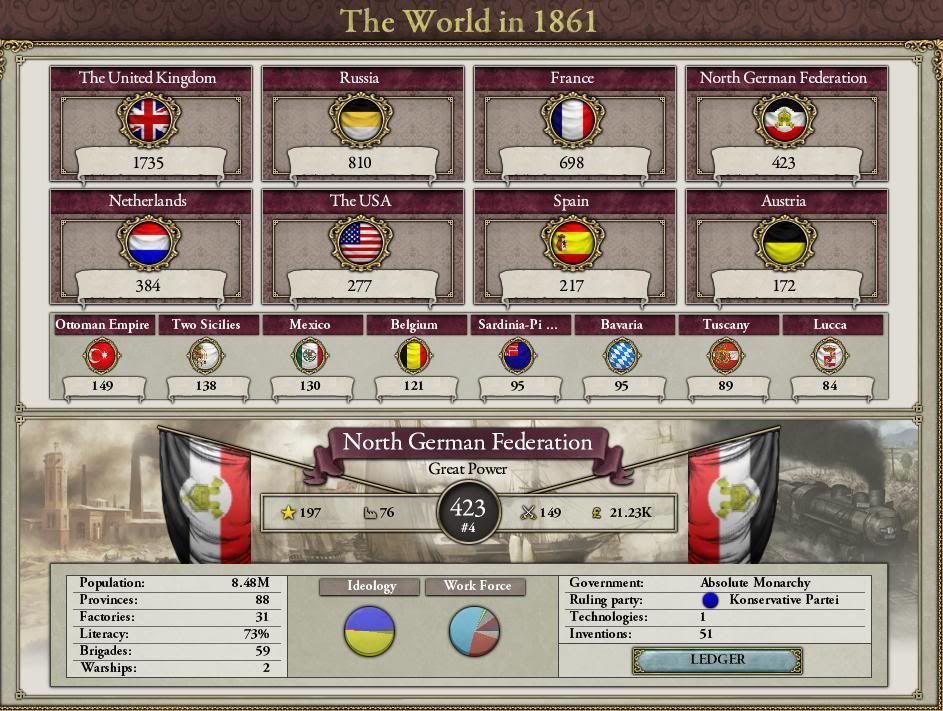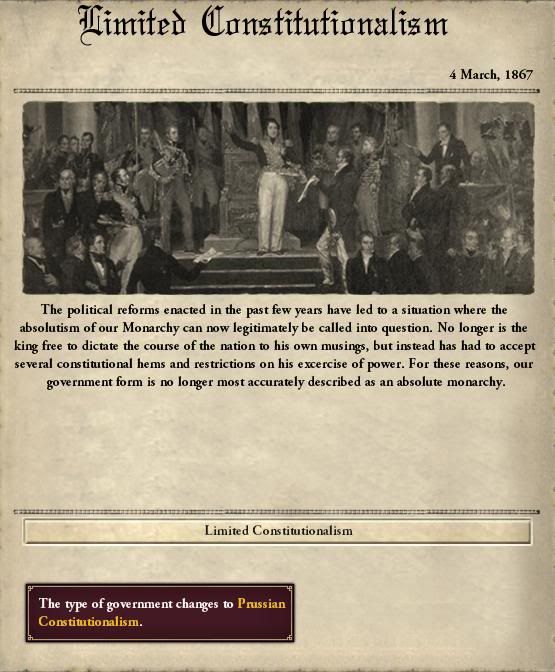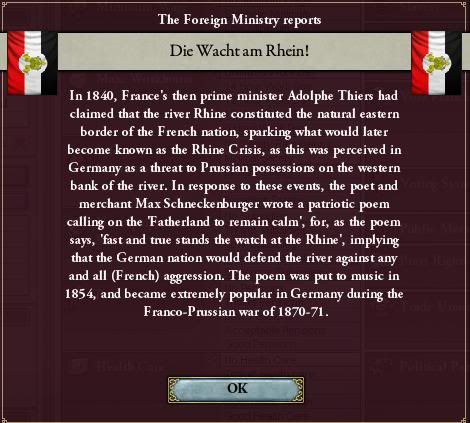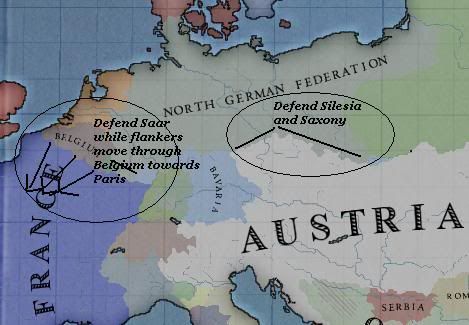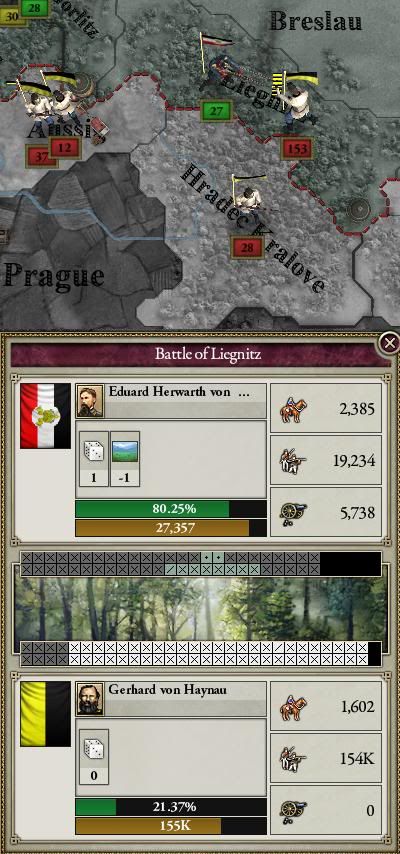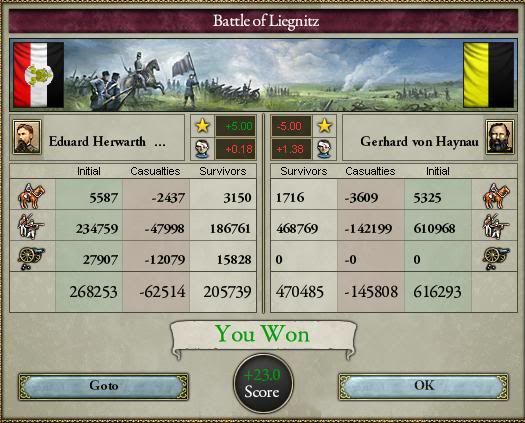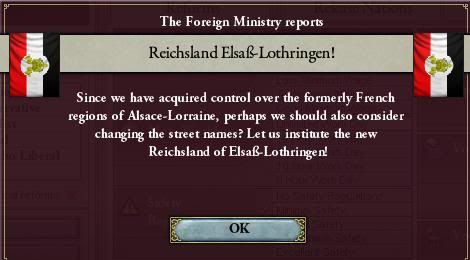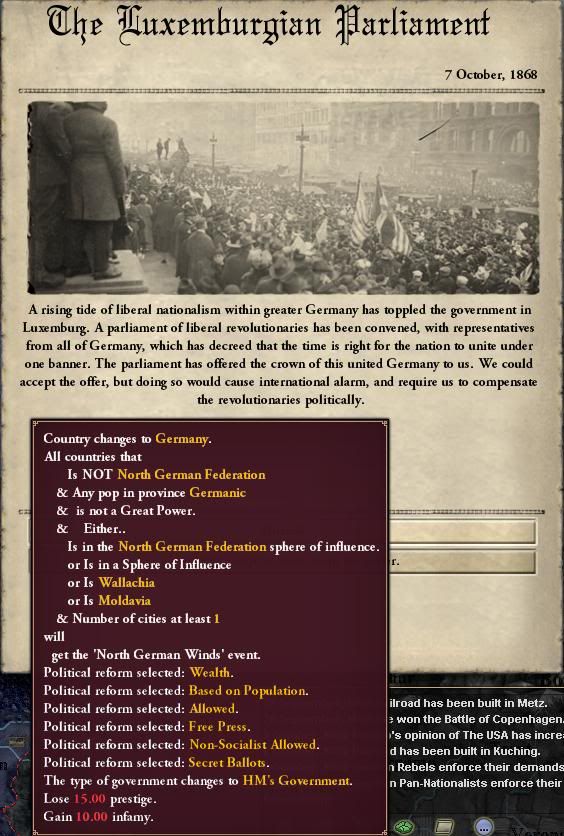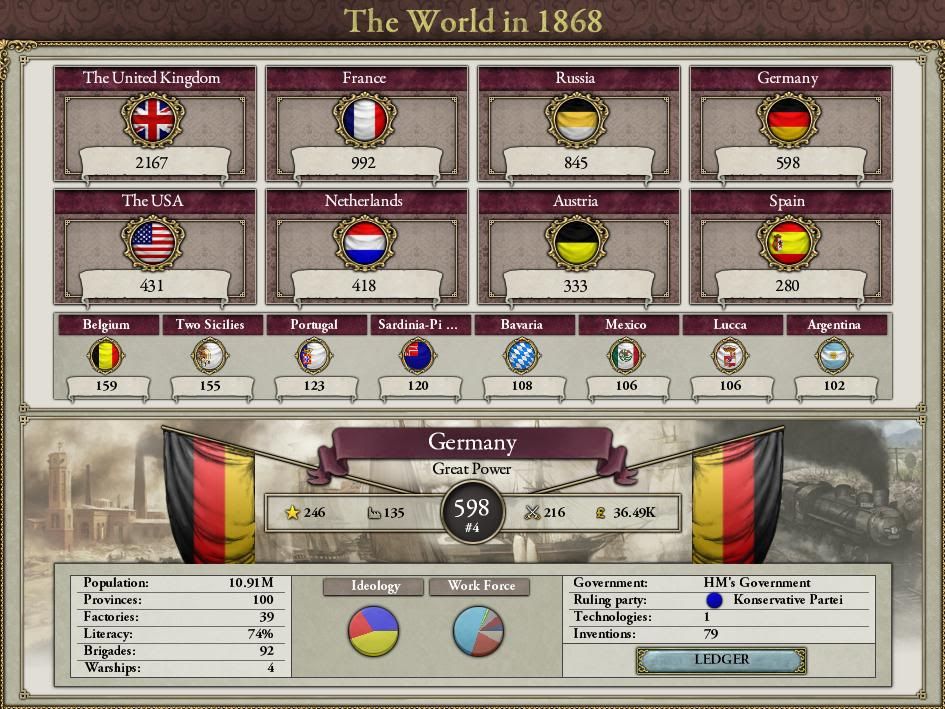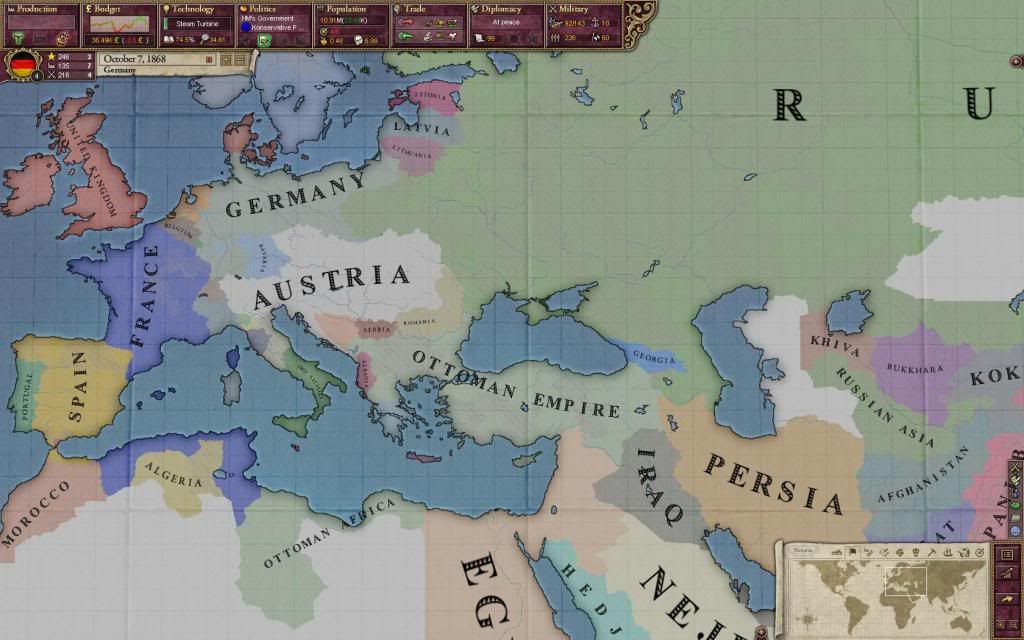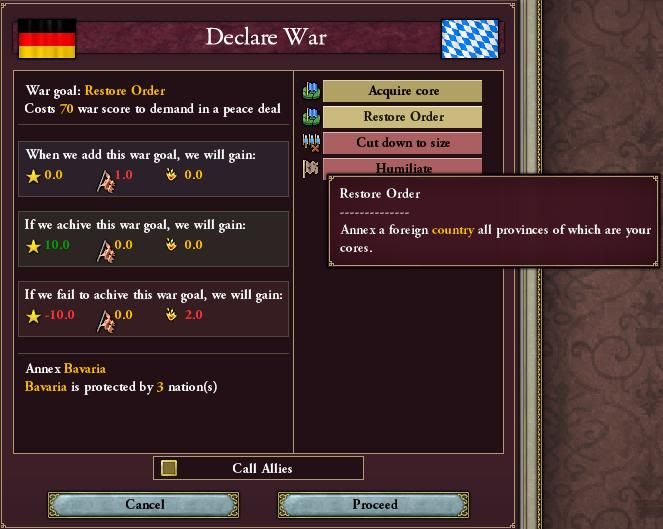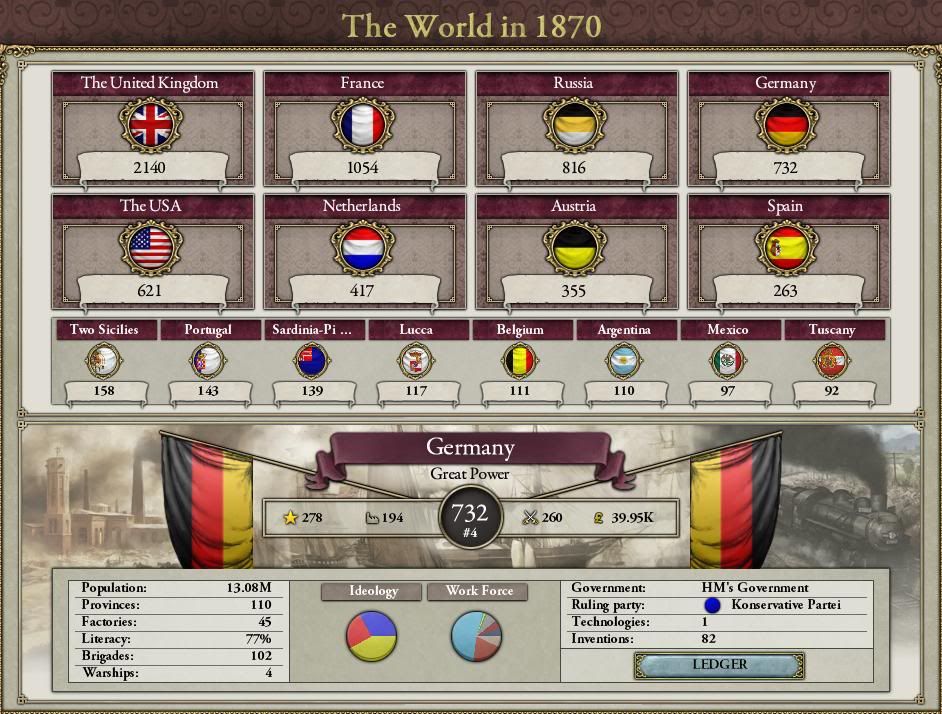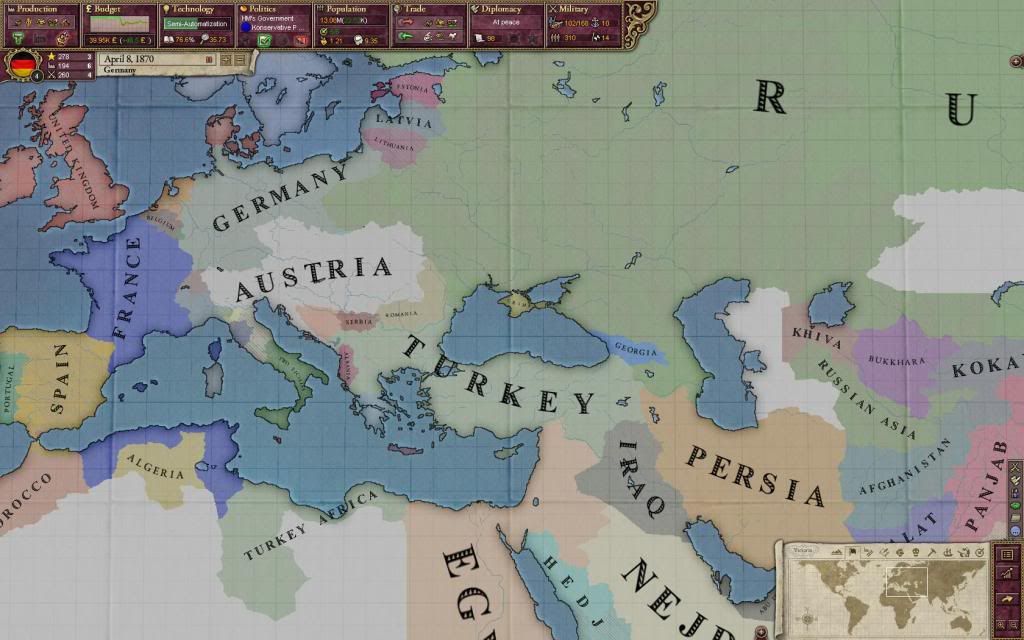PRUSSIA
Part 1, 1836 - 1841
GENERAL STRATEGIC SITUATION
Prussia in 1836 was the dominant German state. Nearly all of northern Germany was in the Sphere of Influence of Prussia, and Prussia holds some land even south in Wurttemburg. There were three notable exceptions to the northen Germany hegemony: Saxony was in the SoI of Austria, Hannover in the SoI of Great Britain, and Holstein was a satellite-state of Denmark. If those three would be in the Prussian Sphear of Influence, a true united Northern German federation would be possible to be formed.
Prussia was an emerging industrial might, with a few factories already existing. While being dwarfed to Great Britain in everything, Prussia was amongst the top three producers of practically any goods; this gave a very nice boost to the domestic trade, and Prussia also exported goods much more than imported.
Prussia was in the unique situation of having four other major powers well within of her capital. The armed force being relatively small, but as the land area of Prussia also were relatively small, Prussia could bring decisive numbers to important battles if she just could employ good leaders to command her armies.
CULTURE AND SCIENCE
The idea of railroads floated around. Prussian scientist and engineers were urged to research and experiment the thought of railroad. Once the ideas had been tested out, a wave of enthuaism spread all over the nation. The ease of movement with the railroads was obvious to all, and the opportunities the railsystem could provide made many new ideas blossom.
Medicine was one of the main focus points in research together with the railroad systems. Prussian breakthroughs in medicine had major impact on all levels of the society. Originally many of the inventions were for the use of the Army, but the innovations were rapidly also utilised for the general population. When it was understood Cholera spreads because of bad sanitation, the outbreaks of the disease saw a massive reduction; this saved especiall many infants, and the population growth in Prussia reached all new levels.
Medical breakthroughs helped everyday life in Prussia
Just as everywhere, in Germany too the rise of nationalim began. A peaceful Mozart festifal in Frankfurt turned into wide-scale protests for a German unification. The pan-german movement sparked to life, to witch the very popular Deutshlandlied provided more fuel. "Deutschland, Deutschland über alles" could be heard all over Germany as people sang the Deutschlandlied.
Many liberals felt the winds of change when the old king Friedrich Wilhelm III died. It was generally felt Friedrich Wilhelm III had been the main reason Prussia had remained so conservative.
POLITICS
Prussia was an absolute monarchy, with the upper house being controlled by conservatives. Still, the population occasionally liked to bring up to discussion the humbug ideas of liberalism, or right to vote, or even the so called "right" to freedom of speech. As such Prussia was very stabile politically though and there's no need for any reforms, but the population must be steered firmly but politely to stay on the correct path.
The pan-german movement caused some revolts in the minor german states. Prussian forces intervened to remove the rebels from the lands allied with Prussia, as they seemed to have difficulties at dealing with the rabble.
ECONOMY
The three most important export goods from Prussia during this period was coal, cattle and (quite suprisingly) fruit. Apparently the global fruit markets had collapsed in mid 1830's, and people all over the globe were paying gold to get Prussian apples.
Private investors were interested in setting up new factories. The state influence to factories was limited to supporting an Explosives factory in Breslau, because it was seen as a very crucial strategic factory even though during peace time there wasn't that much request for explosives.
Once the tests with railroads had become more stabile in summer of 1837, practically all of Prussia saw private railroad networks being set up to provide transportation to and from the factories. The railroads began to be in operating condition during summer of 1839.
MILITARY
The Prussian army was re-organised in the early months of 1836. The 51 brigades strong army (50 brigades at start, plus one recruited artillery brigade) was organised into four 10 brigade armies (1st Army of West (in Cologne), North (in Stettin), East (in Konigsburg), and Silesia (in Breslau)), an independent ten brigades strong Cavalry Guards (in Berlin) and the independent one brigade strong Corps of Wurtemburg (in Sigmaringen). During war a general mobilisation would take place, and the mobilised units would form the Home Guard. The Home Guard would either be used as a support army for the field armies, or as independent brigades to take control of hostile provinces.
A vigorous officer training program was begun, but sadly the first officers to be employed left much to be desired. Later on good commanders became available too, and they would prove to be crucial later on.
The Prussian fleet in Danzig consisting of three transport Clippers was decided to need a bit more strength. A frigate was ordered for the fleet, and later on a Man'o'war. Prussia wouldn't be a major naval power even with these, but it was hoped it would be strong enough to prevent sneaky invasion attempts in the Baltic, while also providing Prussia some ability for minor amphibious operations.
DIPLOMACY
Initial diplomacy was focused on the minor states in Germany. The Austrian threat was very real, and their demands on Silesia very vocal. Thus it was deemed important to make sure as many of the German minors as possible would be allied wthat the other minor states would be allied with, starting with Hamburg and Lubeck (who would be able to send troops under an eventual war with Austria, yet be safely behind the lands of Prussia).
However, the more burning situation was the Holstein issue. In October 1837 Prussia declared on Denmark with the claims of getting Schleswig to Prussia and Denmark releasing its control over Holstein. Danish positions were soon overrun, but Denmark insisted on suggesting White Peace. In October 1838, when Prussian troops were marching on to Copenhagen after the Prussian fleet had utterly destroyed the Danish fleet outside Copenhagen, Denmark gave in to the demands.
Victoria was crowned the Queen of Great Britain on July 1st 1840. This ended the personal union between Great Britain and Hannover, which meant that Hannover was now up for a diplomatic grab from Prussia. Cleverly Prussia had been building diplomatic connections with Hannover for the past years, and Hannover was soon to be in the SoI of Prussia.
Now only Saxony remained to be joined into the Prussian SoI so that the North German Federation could be united. Austria was not only husbanding Saxony with a firm hand (disrupting all Prussian diplomatic actions in Saxony), but also had vocal claims on Silesia. The relations between Prussia and Austria got even more tense.
DE-BRIEF
Prussia in 1841 is a rising industrial power. Great Britain is in a league of their own, but Prussian industrial power is very comparable with the other Major Powers. The army is the smallest of the other great powers, and the fleet is practically non-existant. Still, with Denmark subdued and Hannover free from British control, things certainly are looking good for Prussia.
Europe in 1841
The world in 1841

 What in Victoria 1 was painful micromanagement is in Victoria 2 smooth and intuitive. The game is much easier to get into, and the immersion is great. The music, the historically themed events, the graphics, the ease of play, the depth of the game. It is certainly not a click-away game, but you don't have to be a professional accountant to enjoy the game.
What in Victoria 1 was painful micromanagement is in Victoria 2 smooth and intuitive. The game is much easier to get into, and the immersion is great. The music, the historically themed events, the graphics, the ease of play, the depth of the game. It is certainly not a click-away game, but you don't have to be a professional accountant to enjoy the game.



